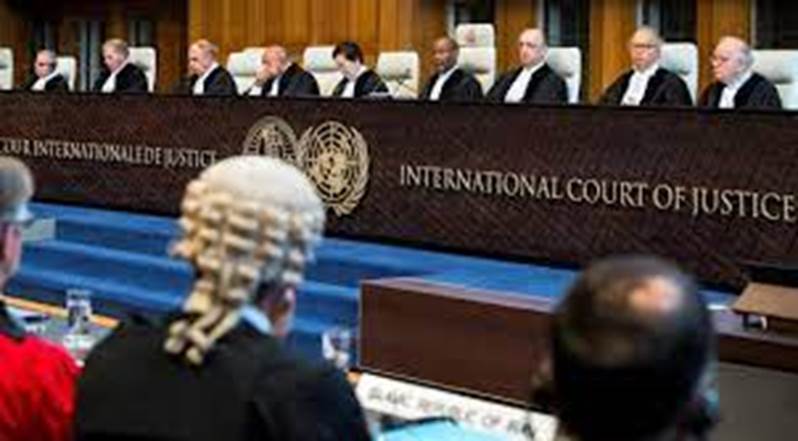
The World Powers Seldom Place Human Rights above Geo-Strategic Concerns
By Dr Ghulam Nabi Fai
Chairman
World Forum for Peace & Justice
Washington, DC

The International Court of Justice in its unofficial press release, issued on December 29, 2023, states, “South Africa today filed an application instituting proceeding against Israel before the International Court of Justice (ICJ), the principal judicial organ of the United Nations, concerning alleged violations by Israel of its obligations under the Convention on the Prevention and Punishment of the Crime of Genocide (the ‘Genocide Convention’) in relation to Palestinians in the Gaza Strip.”
Earlier in December 2019, The Republic of the Gambia, with the support of the Organization of Islamic Cooperation (OIC), also filed a case before the International Court of Justice (ICJ) alleging human rights violations committed by Myanmar against the Rohingya violate various provisions of the Convention on the Prevention and Punishment of the Crime of Genocide (“the Genocide Convention”).
Both these developments are a significant step towards greater international recognition of alleged serious abuses committed against civilian population. Filing of an application at the ICJ may take the veil of secrecy off of alleged human rights violations. Perhaps now the global community can share the outrage felt by the people of the region.
Yet in another part of the globe – Kashmir - atrocities of a similar pattern have been and are being perpetrated by the 900,000 Indian military and paramilitary forces (Figure quoted from an interview with Indian novelist, Arundhati Roy) with no fear of a corrective international response. The scale of the human rights atrocities in Kashmir dwarf those in Kosovo, Bosnia, Sierra Leone, and East Timor which have triggered international interventions. But the world powers and the United Nations have remained silent, not even employing moral suasion against India's shocking indiscriminate violence in Kashmir as was done regarding South Africa during its ugly years of apartheid.
It is worth mentioning here that Dr Gregory Stanton, President, ‘Genocide Watch’ and Chair of the ‘Alliance Against Genocide’ warned the world community on February 5, 2021, that “We believe that the Indian government’s actions in Kashmir have been an extreme case of persecution and could very well lead to genocide.” The world community did not heed his warning. Then he said again on January 18, 2022, that we should be aware that genocide is not an event. It is a process. There are early signs and processes of genocide in Kashmir.
It is painful but necessary to mention here how Indian law grants virtual legal immunity to any type of war crime against humanity perpetrated in Kashmir. Rape is a recognized war crime, and countless Kashmiri women have been raped by Indian army. Torture is an international crime, as the Legal proceedings against General Augustino Pinochet in Great Britain proved. Yet Indian leaders who permit torture in Kashmir are not prosecuted for the crime in jurisdictions they may be visiting. Narendra Modi was banned to enter to the United States and Great Britain because of his involvement in the massacre of Muslims in Gujrat. Now he is being given a red carpet reception in many capitols of the world. Is an international crime less criminal if the aggressor is India and the victim is a Kashmiri, people ask?
The common Kashmiris also ask: Are Kashmiris less human than peoples of other nations? To borrow from Shakespeare in The Merchant of Venice: Hath not a Kashmiri eye? hath not a Kashmiri hand, organs, dimensions, senses, affections, passions; fed with the same food, hurt with the same weapons, subject to the same diseases, healed by the same means, warmed and cooled by the same winter and summer as other peoples are? If you prick us, do we not bleed? If you tickle us, do we not laugh? If you poison us, do we not die?
It is true that violence characteristically stems from dehumanizing an adversary or enemy. The more another seems distant, odd, inferior, or different from yourself, the easier to kill, maim, and oppress. That psychological insight is corroborated by thousands of years of experience. Take genocide. The Nazis and Germans generally perpetrated the Holocaust by demonizing Jews and inculcating the idea of their racial or religious inferiority. Jews looked different from Aryans. Jews were stigmatized as killers of Christ, making them all deicides. In this way, Holocaust participants were able psychologically to block out their villainies by perceiving Jews as subhuman, and thus their extermination as no different than killing animals for food. The Holocaust would never have reached its horrifying scale if Aryan Germans had perceived and treated Jews as human peers and subscribed to John Donne's timeless poetic recognition of the unity of mankind.
The same is true for the genocide of the Tutsi by the Hutu in Rwanda. The two tribes viewed themselves as different, physically, and otherwise. The Hutu resented their sense of inferiority, which they ascribed to Tutsi arrogance. The Tutsi did not treat the Hutus as social equals. Differences led to dehumanization, which fostered mass killing, based on ethnicity.
It is quite possible that if international law were applied evenhandedly in Kashmir, an international war crimes tribunal would have been established years ago to try the scores of Indian civilian and military leaders guilty of crimes against humanity and aggression. What Slobodan Milosevich did in Kosovo and Bosnia pales in comparison to what Indian civilian and military grandees have done in Kashmir for 76 successive years, something resembling genocide on the installment plan.
Let us have a pragmatic view of the world. The world powers seldom place democracy and human rights above geo-strategic or economic concerns. Let me conclude with these sobering observations. Foreign policy in the United States does not emerge from a simple algorithm. It is driven in part by popular emotions, in part by daily headlines, in part by domestic considerations, and in part by long-term global concerns that transcend the momentary and transient. And what relative influence these varied elements play in a particular foreign policy decision varies depending on the country, the timing, and the circumstances. If anyone thinks there are simple markers for predicting American foreign policy, then they are seriously mistaken. It is much more ad hoc and improvised than systematic and thematic. That means the opportunities to try to reason out with the policymakers are great, but so are the hazards and imponderables of such an enterprise. - gnfai2003@yahoo.com

